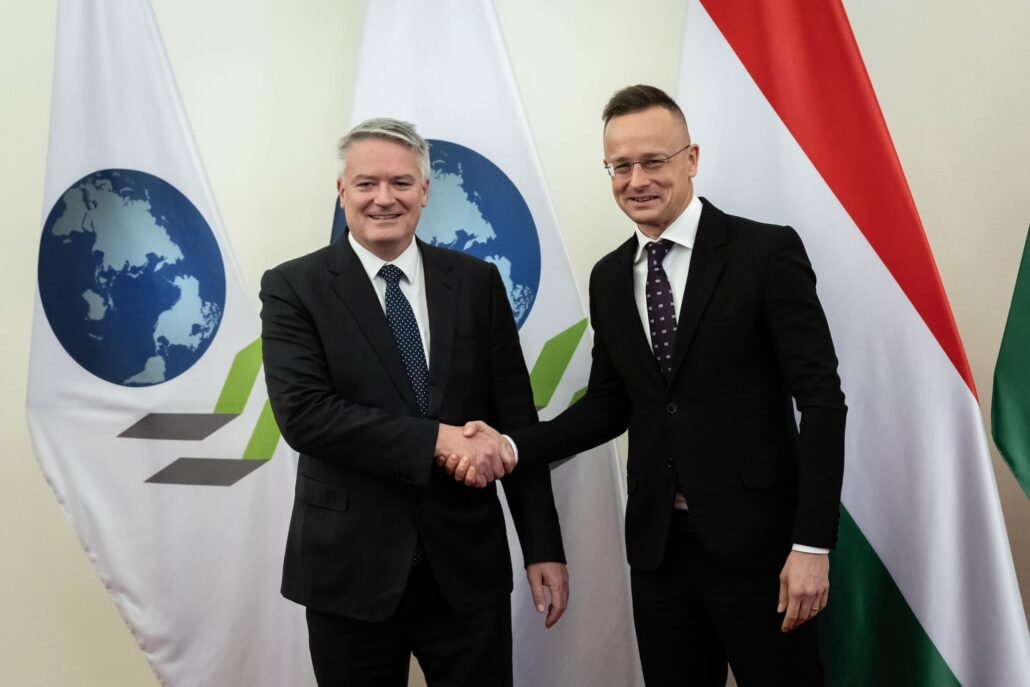Minister Szijjártó to OECD Secretary-General: We only ask Ukraine to respect nationalities, including Hungarians
Ukraine’s response to Hungary’s 11-point document on minority rights is not bringing closer the restoration of the Hungarian community’s rights to 2015 levels, the foreign minister said on Tuesday.
Speaking at a press conference held together with Mathias Cormann, the Secretary-General of the Organization for Economic Cooperation and Development (OECD), Szijjártó said in response to a question that he had made Hungary’s requests clear at his meeting with his Ukrainian counterpart, Dmitro Kuleba, in January. “We asked for no special treatment, only to restore the acquired rights of [ethnic] Hungarians,” he said.
He lamented that Ukraine’s response to the document “contains no progress in that regard”.
Hungary will respond to the response on Wednesday, he said.
“Until Ukraine adopts legislation to restore the rights of Hungarian national minorities, Hungary sees no point in a highest-level meeting,” he said.
Asked about French President Emmanuel Macron’s statement that sending land troops to Ukraine “cannot be excluded”, Szijjártó said it went against NATO’s unanimous decision that direct confrontation with Russia should be avoided at all cost. “In the past two years, amending this decision. has not been tabled in any NATO meetings.”
Hungary will stick to the relevant NATO decision, he said.
Szijjártó calls for restoring common sense to global economy
It is critical to restore “common sense and normality” to the approach to the global economy in order to avoid a long-term slowdown, Szijjártó said on Tuesday, adding that the OECD could play a key role in this.
“We want to avoid a long-term global economic slowdown,” Szijjártó told a joint press conference with OECD Secretary-General Mathias Cormann, according to a ministry statement. “We believe that this requires restoring common sense and normal thinking to the global economy.”
“This common sense and normal way of thinking is in no way compatible with initiatives aimed at isolating the Eastern and Western economies,” the minister said. “It is incompatible with sanctions policies that lead to soaring energy prices and inflation.”
“It is incompatible with turning the cause of the green transition into a kind of political and ideological monopoly, with treating energy cooperation as an ideological issue rather than a practical one, and with pro-war political strategies,” he added.
Instead, Szijjártó said, everything must be done in the interest of restoring cooperation based on mutual respect between East and West.
He said this cooperation assumed world trade based on fair competition. This, he added, should not restrict tax competition and should include responsible growth strategies in which environmental protection and the improvement of competitiveness went hand in hand.
“We must admit that it is a peaceful environment that creates the best opportunity for economic growth,” Szijjártó said. He said Hungary was “a living example” of how common sense allowed for the implementation of a successful economic strategy that had allowed the country to maintain economic growth.
Szijjártó said it was such a strategy that had made Hungary a “meeting point” for investments from the East and West where “every economic player has a chance for free and peaceful cooperation”.
He said restoring common sense to thinking about the global economy required international organisations that promoted this way of thinking, adding that the OECD was such an organisation.
He said cooperation with the OECD had helped Hungary with enacting common-sense economic strategy decisions in recent years.
“It is the OECD that represents common sense and normality in the international economy today,” the minister said, adding that the organisation could be key in preventing the re-emergence of geopolitical blocs and maintaining connectivity in the coming years.
Hungary therefore supports the OECD’s efforts, its enlargement, increasing its budget, as well as the secretary-general’s efforts in making the OECD “an even more successful international organisation”, he said.
read also:
please make a donation here
Hot news
Defence Minister: Drawing NATO into conflict would lead to world war
Abandoned for eternity: 5 spooky places in Hungary – PHOTOS, VIDEOS
Uzbekistan Hungary concludes important new agreements and resumes direct flights
Radical drop in fuel prices in Hungary: tomorrow, there will be another change
Great news: It will be easier to reach Lake Balaton by train very soon
Ukraine, Gaza, Sahel: Orbán cabinet says Hungary ‘cannot be accused of lacking solidarity’





